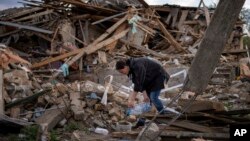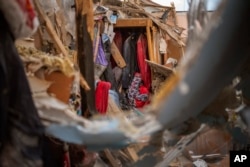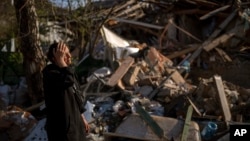A woman who lost her home in the Ukraine war is finding hope from flowers that survived the destruction.
Anna Shevchenko loved gardening around her home in Irpin. The town is outside Ukraine’s capital, Kyiv. The 35-year-old schoolteacher says she felt a calming effect while caring for her plants, flowers and trees.
Shevchenko fled Irpin around March 10 with other family members, as the Russian military intensified its offensive in an attempt to capture Kyiv. Her father stayed behind, hoping to save the family home. But he was also forced to leave when the Russian shelling intensified and got closer to the neighborhood.
Most of the home was destroyed in the conflict. Shevchenko recently returned to Irpin and spoke to reporters from The Associated Press. The main part of the home had been flattened and reduced to a collection of rubble.
Before returning, Shevchenko was able to see a picture of the destroyed home. She told reporters her grandparents had built the home “brick by brick.”
“I tried to prepare myself to see it with my own eyes,” she said. Shevchenko added, “and then the next moment -- I looked and I saw the flowers.”
She could see some living flowers that she had dutifully cared for during happier times. Among them were a small group of daffodils and a small peony that rose above the destruction. Some were damaged, but not broken. Her tulips were starting to bloom.
“It was new life,” she said. “So I tried to save my flowers.” A long piece of concrete now serves as protection for the peony, which has grown new leaves. She removed a large piece of plastic from her flowering peach tree and watered a small lily plant that had risen from under a piece of concrete.
By the time winter began turning into spring, Shevchenko’s family had already paid a heavy price in Russia’s war against Ukraine. On the same day they lost their home, Shevchenko’s father lost his leg to an explosion as he tried to flee Irpin. Her father is a man in his early 60s who had been very active and loved to ride his bicycle. Now, he almost never leaves the apartment where he has been staying since being released from the hospital.
The father has not yet seen what happened to his home. He also has not seen his bicycle, which lies smashed under broken bricks in an area that used to be his front garden.
Shevchenko said her grandparents built one part of the house for her mother, then added on another part for her uncle, which she had been living in. The addition of the house was damaged but not totally destroyed. As Shevchenko looked at the rubble, she wondered whether it was possible to save anything or if the whole house should be torn down and rebuilt.
Even with all of the destruction and her father’s serious injury, Shevchenko says at least her family members are still alive. Now, when she watches new life rise from the earth in the middle of so much destruction, it gives her hope for the future.
“We have another chance,” she said, “to live.”
I’m Bryan Lynn.
The Associated Press reported this story. Bryan Lynn adapted the report for VOA Learning English.
We want to hear from you. Write to us in the Comments section, and visit our Facebook page.
____________________________________________________________
Words in This Story
gardening – n. to work in a garden: to take care of plants and flowers
rubble – n. pieces of broken bricks and other materials from a building that has been destroyed
brick – n. a small, hard, rectangular block used for building walls, houses, etc.
moment – n. a very short period of time
bloom – v. when a plant’s flowers open
concrete – n. a hard, strong material that is used for building and made by mixing cement, sand, and broken rocks with water









